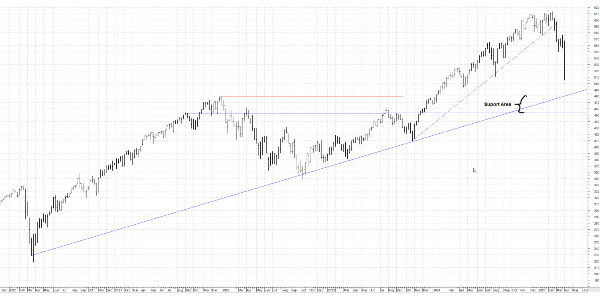The stock market has faced significant challenges recently, with many investors expressing concern over falling portfolios and the impact of various economic factors like tariffs. While headlines often attribute market fluctuations to specific events, the reality is far more complex. This article explores the dynamics behind recent market activity, why the market appears to be falling, and actionable strategies to help retail investors weather the storm.
Why Is the Stock Market Falling?
Contrary to popular belief, the recent stock market decline isn't solely due to tariffs. While they may play a role, the fundamental issue lies in market overvaluation. By November, intrinsic values of many stocks had diverged significantly from their prices, signaling a correction was imminent.
Intrinsic Value Monitoring: Savvy investors, like the speaker, track intrinsic values of high-quality stocks quarterly. When prices soar beyond realistic earning expectations, it often foreshadows market instability.
Overvaluation Cycle: Even before tariffs gained attention, the market started to correct itself. Headlines attributing these fluctuations solely to political developments oversimplify a multi-faceted situation.
The Role of Government and Market Policy
Understanding how government policy interacts with the economy is crucial. While government initiatives can spur growth, they cannot fundamentally fix the economy. Instead, economic growth relies on innovation, free markets, and contributions from individuals—entrepreneurs, managers, workers, and beyond.
Key insights include:
- Governments may unintentionally disrupt sectors by introducing sweeping policies without accounting for their complexities.
- A healthy system where individuals can innovate and interact freely with the market drives sustained economic expansion.
What Should Investors Do Now?
Investors are often left wondering how to react during periods of instability. Here are some strategies to consider:
Dollar-Cost Averaging
One of the safest approaches for retail investors is to continue investing consistently over time. By averaging the cost of investments during market lows, you position yourself to benefit as the market recovers.
Patience and Timing
According to the speaker’s analysis, stock valuation and market sentiment often diverge temporarily. By giving the market time—around six weeks, in this case—to stabilize, investors can identify opportunities to purchase undervalued stocks.
Opportunities Amid Capitulation
As stocks correct to healthier valuations, investors should adopt a predator mindset. Look for high-quality, undervalued assets that have strong growth potential and are positioned to recover.
Future Outlook and Long-Term Growth
Despite current challenges, the long-term outlook for the U.S. economy remains promising. Innovations like space exploration, AI advancements, and other technological revolutions could fuel unprecedented growth in the coming decades. Investors who focus on future-oriented strategies are likely to reap significant rewards.
Leveraging Resources for Better Insights
For those seeking deeper analysis and actionable investment ideas, platforms like Stock Boss offer invaluable insights. By curating advice from expert YouTubers and analysts, Stock Boss helps investors cut through the noise and focus on strategies that work.
Conclusion
Market downturns can be daunting, but they often present unique opportunities for those willing to embrace disciplined strategies. By understanding the true causes of market fluctuations and focusing on long-term growth, retail investors can navigate uncertainty and emerge stronger.
https://youtu.be/G-nXgNKAv3o






























The stock market has faced significant challenges recently, with many investors expressing concern over falling portfolios and the impact of various economic factors like tariffs. While headlines often attribute market fluctuations to specific events, the reality is far more complex. This article explores the dynamics behind recent market activity, why the market appears to be falling, and actionable strategies to help retail investors weather the storm.
Why Is the Stock Market Falling?
Contrary to popular belief, the recent stock market decline isn't solely due to tariffs. While they may play a role, the fundamental issue lies in market overvaluation. By November, intrinsic values of many stocks had diverged significantly from their prices, signaling a correction was imminent.
Intrinsic Value Monitoring: Savvy investors, like the speaker, track intrinsic values of high-quality stocks quarterly. When prices soar beyond realistic earning expectations, it often foreshadows market instability.
Overvaluation Cycle: Even before tariffs gained attention, the market started to correct itself. Headlines attributing these fluctuations solely to political developments oversimplify a multi-faceted situation.
The Role of Government and Market Policy
Understanding how government policy interacts with the economy is crucial. While government initiatives can spur growth, they cannot fundamentally fix the economy. Instead, economic growth relies on innovation, free markets, and contributions from individuals—entrepreneurs, managers, workers, and beyond.
Key insights include:
What Should Investors Do Now?
Investors are often left wondering how to react during periods of instability. Here are some strategies to consider:
Dollar-Cost Averaging
One of the safest approaches for retail investors is to continue investing consistently over time. By averaging the cost of investments during market lows, you position yourself to benefit as the market recovers.
Patience and Timing
According to the speaker’s analysis, stock valuation and market sentiment often diverge temporarily. By giving the market time—around six weeks, in this case—to stabilize, investors can identify opportunities to purchase undervalued stocks.
Opportunities Amid Capitulation
As stocks correct to healthier valuations, investors should adopt a predator mindset. Look for high-quality, undervalued assets that have strong growth potential and are positioned to recover.
Future Outlook and Long-Term Growth
Despite current challenges, the long-term outlook for the U.S. economy remains promising. Innovations like space exploration, AI advancements, and other technological revolutions could fuel unprecedented growth in the coming decades. Investors who focus on future-oriented strategies are likely to reap significant rewards.
Leveraging Resources for Better Insights
For those seeking deeper analysis and actionable investment ideas, platforms like Stock Boss offer invaluable insights. By curating advice from expert YouTubers and analysts, Stock Boss helps investors cut through the noise and focus on strategies that work.
Conclusion
Market downturns can be daunting, but they often present unique opportunities for those willing to embrace disciplined strategies. By understanding the true causes of market fluctuations and focusing on long-term growth, retail investors can navigate uncertainty and emerge stronger.
https://youtu.be/G-nXgNKAv3o